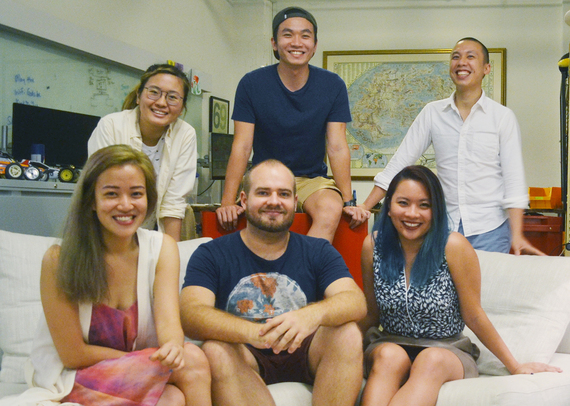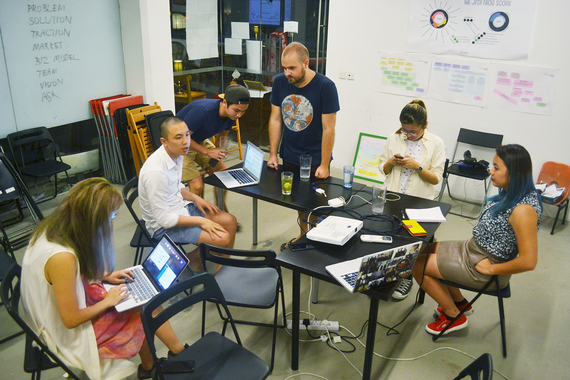Young & Entrepreneurial is a series of articles where we interview and write about young individuals innovating, venturing out, taking risks and disrupting the world. This is the 24th post in the Young & Entrepreneurial Series. To read previous features, visit our Facebook page here. If you want to stay up to date with this series, sign-up for our newsletter here.
You can call them the hipsters, the millennials, the crazy ones, the ex-consultants, the immigrants but the Quarter Life Crisis (QLC) team has found a problem they want to solve, and yes, you got it right, they want to help people overcome their quarter life crisis by giving them an option to try out new roles and jobs part-time without having to quit their current jobs.
It was during my one-month stint as a content marketer in JFDI Asia where I got the chance to sit down with the QLC.io core team composed of cofounders Will Fan and Fei Yao, and CTO Luke Johnson.
QLC.io is a platform that helps connect highly talented, well-trained professionals with short-term projects. These professionals usually don't have the right networks to get into the industry that they want to go into or the skillset that they want to build or social venture they want to get involved in.
This is a solution to an overarching psychological problem that the QLC.io team sees and has experienced themselves as part of the millennial generation. Fei shared with me articles with headlines like, "Why Generation Y Yuppies Are Unhappy", and "Why Are Harvard Grads Still Flocking to Wall Street?" to help articulate the problem they're trying to solve. But where did it all start?
From Accenture consultants to part-time entrepreneurs
Will and Fei first met as consultants in Accenture back in Australia when they realized that they faced the same problem. While consulting allowed them to meet a lot of people, travel to new places and work in a lot of different industries, both of them weren't really aligned with the mission and vision of what they were doing.
This led them to venture out and do a few different side projects, including their first startup called Couchelo, a vintage furniture market place for Australia. In order to make this happen, Will and Fei decided to outsource the creation of the web platform, spending $5000 in the process. They would also start learning the basics of design through General Assembly.
Will and Fei had been doing Couchelo for 6 months before the idea for doing an accelerator started popping into their minds. Fei shared, "We would spend 40-50 hours on their day jobs at Accenture then the rest of their time on Couchelo, including the weekends."
She added, "It basically got to a point where we realized we had to commit full time or it would be a very very slow and long process."
The leap of faith to Singapore
A quick Google search for Accelerators in Asia would lead them to the Joyful Frog Digital Incubator (JFDI) Asia. A few weeks later, and the team composed of Will, Fei and a third cofounder (who has since left the team) decided to take the leap of faith and fly to Singapore, where they had to start from ground zero.
While the team had only gotten into JFDI Discover, a 21-Day Online Pre-Accelerator program, after 3 weeks of customer discovery, lean startup development and business development, they would get into JFDI's Accelerate program. This is when their first big pivot would happen.
Will shared, "We came to Singapore and we wanted set it up from scratch. But we realized it wouldn't work in Singapore because locals don't really value vintage furniture."
JFDI Cofounder Meng Wong also asked all the startups upon being accepted to the accelerator, "why are you the right person to do what you're doing and why are you the only person who can do what you do?"
The Couchelo team would then go through a discovery process and ask themselves why they were doing furniture in the first place. Will shared, "We realized that we weren't really the best people to work on the vintage furniture market. It just so happened to be our first step into the startup space. So we decided to pivot to something that we knew best, which was understanding millennials."
Fei added, "We took a step back to why we came to Singapore to begin with. It was more of the fact that we were so desperate to get out of our jobs that we were looking for any reason to get out of it."
She added, "I didn't really know what an accelerator was at that time. I wasn't even sure what startup we would be working on. I wasn't even sure what Singapore was like."
This understanding of what it means to be a millennial and the problems this generation faces led them to pivot to Quarter Life Crisis (QLC), in hopes of helping other millennials find meaningful work through short internships and part-time work.
The Pivot to the 'Quarter Life Crisis' (QLC)
It was at this same pivot that the team would suffer a major blow, as the team's third cofounder's girlfriend would get diagnosed with cancer leading him to have to go back to Australia and work remotely. This would be too hard of an engagement leading to his eventual departure--the QLC team was down to Will and Fei.
Will shared, "As nontechnical people, we needed to learn a bit of code and design stuff from scratch while figuring out our business as well."
More challenges would come, but for Will and Fei, "it became about solving a much larger problem" and the roller coaster ride of being an entrepreneur. Will and Fei shared stories of how they had maxed out their credit cards and the struggles with VISA and immigration laws.
Will shared, "In the first month in Singapore, we were switching hostels every two weeks. For the 4-6 weeks, we were staying in an 18-person hostel room in Chinatown. Hostels in Singapore aren't even cheap but we couldn't rent an apartment because we didn't have an employee pass."
But all these were part of the goal of solving this bigger problem and building something that matters. Will added, "You need to put yourself out there. You're so scared about what's around the corner and failing but in reality, you're just failing quicker and figuring out all these opportunities. The quarter life crisis is bigger than all of us. But it's something we're really passionate about."
Building something users love
With a goal of building something that users love, the QLC.io team made sure to learn from their previous mistake with Couchelo of not validating the market. They would spend the first two months just talking to customers, interviewing more than 200 colleagues in the process.
Fei shared, "We went about trying to figure out what would cost people like us who had stable high paying jobs to leave overnight with really high uncertainty. That was where the idea for QLC.io was born."
The idea for how QLC.io would work would actually come from one of these interviews that Will and Fei had done with a guy who was running a fashion business. Fei shared, "One of his marketing team members was actually a full-time professional accountant, who was sick of his accounting job that he was willing to help out with the marketing on the side for free."
At the same time, taking a customer first approach allowed Will and Fei to build things on the fly and stay super lean unlike what they had done with Couchelo. Will shared, "We started out with a spreadsheet instead. We read a lot about examples of lean products, and started using a lot of Mailchimp, spreadsheets, Paypal and sending individual emails."
This would be their platform for the first 6 months, where they would gain a lot of traction, with a business model that also made revenue from the very first day charging both the enterprises and the individuals. Will shared, "We had several thousand sign-ups and more customers then we could handle. This is when we decided to bring in Luke because we needed someone who could build our tech platform."
Prior to joining QLC.io, Luke was actually the CTO of a different JFDI startup that ended up not pushing through. However, this experience of pivoting and failing would help Luke immediately fit into the culture of the QLC.io team. Luke has since built the new platform and has been the CTO of the team for the past 2 months. With Luke on board, the team has been able to ship new features and not have to rely on outsourcing new features.
Memorable moments and lessons learned
Fei recalls the first month they were in Singapore, she wouldn't let anyone in the team eat anything more than $5 because they didn't know how long they would be there so she figured that they would have to ration. But eventually she shared, "You become more comfortable living in your own skin and just enjoying the moment. Think enough so you have a plan but beyond that you get so much more value out of just doing step 1."
Accepting failure and coming to terms with their situation was also a lesson they had learned from Couchelo and QLC.io. Will shared, "It's all about having that mindset that things might not work and that it might not be a billion dollar business but that's okay. Failing is just learning how to not fail the next time--learning how to fail not as hard the next time."
Fei also emphasized the importance of thinking about the worst-case scenario in order to overcome your fears. For the QLC.io team, the worst-case scenario of quitting their traditional jobs was meeting a lot of cool people and going through an invaluable experience as entrepreneurs.
Luke echoed similar thoughts saying, "I asked myself, 'realistically, what's the worst thing that can happen if I go out and do my own business?" Will added, "It's about being able to accept the instability that comes with entrepreneurship and learning how to embrace change."
While QLC.io just secured an investment round a month back, the team knows that there will still be a lot more challenges and bumps along the way but they're here to stay and help the millennial generation solve their quarter life crisis one day at a time.
You can learn more about QLC.io and how they're solving the Quarter Life Crisis by visiting their website here.
Enjoyed reading the article? We hope you could click the share button and help us inspire the next-generation of entrepreneurs. You can also find previous features on our Facebook page here.
---About the Author---
David Ongchoco is a student entrepreneur and avid storyteller from the Philippines studying at the University of Pennsylvania majoring in what he likes to call, LIFE. He is currently working on expanding his nonprofit organization YouthHack. It's David's goal to make an impact in the lives of as many people possible while constantly learning new things every single day. David can be reached at david@youthhack.net.

